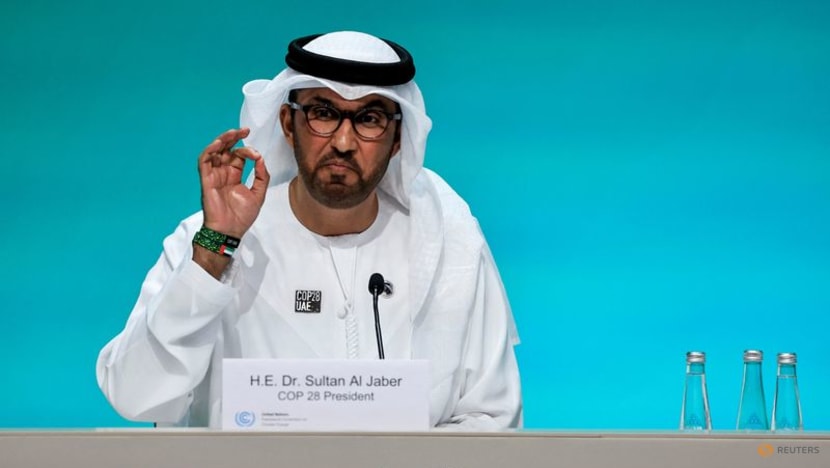Commentary: COP28 president is wrong – science clearly shows fossil fuels must go (and fast)
The evidence for a fossil fuel phase-out is clear. The debate should now turn to executing it, says this University College London energy researcher.

United Arab Emirates Minister of Industry and Advanced Technology and COP28 President Sultan Ahmed Al Jaber speaks during a press conference at the United Nations Climate Change Conference (COP28) in Dubai, United Arab Emirates, on Dec 4, 2023. (Photo: Reuters/Thaier Al-Sudani)

This audio is generated by an AI tool.
LONDON: According to the president of COP28, the latest round of United Nations climate negotiations in the United Arab Emirates, there is “no science” indicating that phasing out fossil fuels is necessary to restrict global heating to 1.5 degrees Celsius.
Dr Sultan Al Jaber is wrong. There is a wealth of scientific evidence demonstrating that a fossil fuel phase-out will be essential for reining in the greenhouse gas emissions driving climate change. I know because I have published some of it.
Back in 2021, just before the COP26 climate summit in Glasgow, my colleagues and I published a paper in Nature entitled Unextractable Fossil Fuels in a 1.5°C World. It argued that 90 per cent of the world’s coal and around 60 per cent of its oil and gas needed to remain underground if humanity is to have any chance of meeting the Paris Agreement’s temperature goals.
Crucially, our research also highlighted that the production of oil and gas needed to start declining immediately (from 2020), at around 3 per cent each year until 2050.
This assessment was based on a clear understanding that the production and use of fossil fuels, as the primary cause of CO2 emissions (90 per cent), needs to be reduced in order to stop further heating. The Intergovernmental Panel on Climate Change (IPCC) says that net zero CO2 emissions will only be reached globally in the early 2050s, and warming stabilised at 1.5 degrees Celsius, if a shift away from fossil fuels to low-carbon energy sources begins immediately.
If global emissions and fossil fuel burning continue at their current rates, this warming level will be breached by 2030.
Since the publication of our Nature paper, scientists have modelled hundreds of scenarios to explore the world’s options for limiting warming to 1.5 degrees Celsius. Many feature in the latest report by the IPCC. Here is what they tell us about the necessary scale of a fossil fuel phase-out.
FOSSIL FUEL USE MUST FALL FAST
A recent paper led by atmospheric scientist Ploy Achakulwisut took a detailed look at existing scenarios for limiting warming to 1.5 degrees Celsius. For pathways consistent with 1.5 degrees Celsius, coal, oil and gas supply must decline by 95 per cent, 62 per cent and 42 per cent respectively, between 2020 and 2050.
However, many of these pathways assume rates of carbon capture and storage and carbon dioxide removal that are likely to be greater than what could be feasibly achieved. Filtering out these scenarios shows that gas actually needs to be eliminated twice as fast, declining by 84 per cent in 2050 relative to 2020 levels. Coal and oil would also see larger declines: 99 per cent and 70 per cent respectively.
In fact, oil and gas may need to be eliminated even quicker than that. A study by energy economist Greg Muttitt showed that many of the pathways used in the most recent IPCC report assume coal can be phased out in developing countries faster than is realistic, considering the speed of history’s most rapid energy transitions. A more feasible scenario would oblige developed countries in particular to get off oil and gas faster.
A FAIR AND ORDERLY TRANSITION
The International Energy Agency (IEA) has added to evidence in favour of phasing out fossil fuels by concluding that there is no need to licence and exploit new oil and gas fields, first in a 2021 report and again this year.
This latest IEA analysis also estimates that existing oil and gas fields would need to wind down their production by 2.5 per cent a year on average to 2030, accelerating to 5 per cent a year from 2030 (and 7.5 per cent for gas between 2030 and 2040).
A separate analysis of the IPCC’s scenarios for holding global warming at 1.5 degrees Celsius came to the same conclusion. Since no new fields need to be brought into development, global production of oil and gas should be falling.
This message was reinforced by the UN’s recent production gap report, which concluded that producer countries including the United Arab Emirates need to be moving towards a rapid phase-out of fossil fuels, not expanding production. Instead, the report estimated that in CO2 terms, planned fossil fuel production in 2030 is projected to be 110 per cent higher than the required phase-out trajectory to meet 1.5 degrees Celsius.
The evidence for a fossil fuel phase-out is clear. The debate should now turn to executing it.
A fair and orderly transition from fossil fuels must acknowledge the differing capacity of countries: Developing countries are more economically dependent on fossil fuels and have less money to switch to cleaner technologies. Some investment in oil and gas will be needed for existing infrastructure. This would maintain the minimum level of production necessary for a carefully managed transition. Overall though, fossil fuels should now be in rapid decline.
Rich countries need to phase out fossil fuels now and raise the funding to help developing countries make the transition.
Steve Pye is Associate Professor in Energy Systems at University College London. This commentary first appeared in The Conversation.














